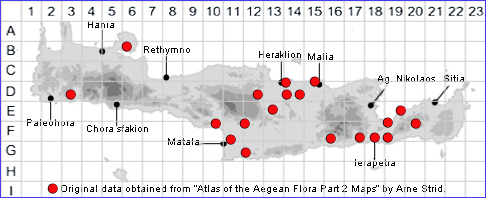SPECIES DESCRIPTION
OPHRYS OMEGAIFERA var BASILISSA
Family and Genus:- See- ORCHIDACEAE
Common Name:- Royal ophrys
Homotypic Synonyms:- Ophrys basilissa, Ophrys omegaifera subsp.
basilissa.
Meaning:- Ophrys (L) Eye-brow, a name used by the Roman naturalist and
philosopher Pliny.
Omegaifera (L) Omega shaped (reference to the "W" shaped
marking).
Basilissa (Gr) May refer to: Basilinna or Basilissa, the ritual queen who
was wed to Dionysus during the Anthesteria in ancient Athens. Note by A Alibertis
"Orchids of Greece" (We gave it this name because the flower seemed "royal" due
to it's size and because it was first found near the palace of Faistos).
General description:- Short to medium perennial
Stem:-
1) To 15-25 cm.
Leaves:-
1) Basal, oval, blunt.
2) Cauline, narrower and pointed.
Flowers:-
1) Inflorescence, sparse, with 2-4 (-6) large flowers, which clearly look like boxing
gloves.
2) Sepals, 13-20 mm. green with three veins.
3) Petals, 10-14 mm. green with purple edging, and may have a very slight
wavyness.
4) Labellum, 17-28 x I7-28 tri-Iobed, without a longitudinal furrow at the base,
velutinous, dark brown in colour and velvety, blazon, brown or blue-violet
bordered, by a Greek omega, shiny grey-blue, blue or white, both side lobes and
middle, lobe gently downward-curved in front.
a) mid-lobe, notched.
b) sides-lobes, triangular.
5) Stigmatic cavity 45-6 x 4-5.5 mm.
Key features:-
1) Labellum, 17-28 x I7-28 tri-Iobed, both side lobes and middle lobe, gently
downward-curved in front
Habitat:- Meadows, grassy places in dry open shrubby vegetation, open ground on
basic subsoil. 0-800 m.
Distribution:- Indigenous to Crete and can be found growing all over the island, but
particularly in central and eastern Crete.
Flowering time:- Feb-Apr.
Photos by:- Fotis Samaritakis

